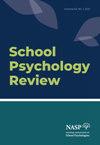情感师生关系在欺凌和同伴受害中的作用:多层次元分析
IF 3
3区 心理学
Q1 Social Sciences
引用次数: 7
摘要
摘要:这项荟萃分析综合了情感师生关系与欺凌行为和同伴伤害之间关系的证据。通过系统的数据库搜索,获得了65项符合纳入标准的初级研究(k)。最终样本包括185881名从学前班到高中的学生。对欺凌行为进行了单独的多层次分析(k = 25,N = 97627)和同伴受害(k = 57,N = 151653)。结果显示小到中等,师生关系质量与欺凌行为(r=−.17,95%CI[-.21,−.14])和同伴受害(r=–.14,95%CI[-.17,−.11])呈负相关。师生关系质量也与较少的同伴受害有关(b=−0.05,95%CI[−0.08,−0.02])少数民族学生的欺凌行为更为严重,而且当同一个告密者报告了这两个变量时。消极(如冲突)关系指标与同伴受害的关联性强于积极(如亲密)关系指标,并且当两个变量都使用同一信息者时。总体而言,研究结果表明,高质量的师生关系与较少的欺凌行为和较少的同伴伤害有关。因此,促进积极的师生关系并尽量减少消极的师生关系可能有助于解决学校欺凌和同伴受害问题。影响声明当前的荟萃分析研究了情感师生关系与学校中两个持续存在的问题之间的联系:欺凌行为和同伴伤害。包括65项初级研究在内的结果表明,更高质量的师生关系与更少的欺凌行为和更少的同伴伤害有关。因此,促进积极和尽量减少消极的师生关系可能是学校欺凌预防和干预工作的重要目标。本文章由计算机程序翻译,如有差异,请以英文原文为准。
The Role of Affective Teacher–Student Relationships in Bullying and Peer Victimization: A Multilevel Meta-Analysis
Abstract This meta-analysis synthesizes evidence about the associations of affective teacher–student relationships with bullying perpetration and peer victimization. A systematic database search resulted in 65 primary studies (k) that met the inclusion criteria. The final sample included 185,881 students from preschool to high school. Separate multilevel analyses were conducted for bullying perpetration (k = 25, N = 97,627) and peer victimization (k = 57, N = 151,653). Results showed small to medium, negative overall correlations between teacher-student relationship quality and both bullying perpetration (r = −.17, 95% CI [−.21, −.14]) and peer victimization (r = −.14, 95% CI [−.17, −.11]). Teacher-student relationship quality was also related to less subsequent peer victimization (b = −0.05, 95% CI [−0.08, −0.02]). Associations between teacher-student relationship quality and bullying were stronger for ethnic minority students and when the same informant reported about both variables. Associations with peer victimization were stronger for negative (e.g., conflict) than for positive (e.g., closeness) relationship indicators and when the same informant was used for both variables. Generally, findings demonstrate that higher-quality teacher-student relationships are related to less bullying perpetration and less peer victimization. Hence, promoting positive and minimizing negative teacher-student relationships may help to tackle school-based bullying and peer victimization. Impact Statement The current meta-analysis examined the link between affective teacher-student relationships and two persistent problems in schools: bullying perpetration and peer victimization. Results including 65 primary studies demonstrated that higher-quality teacher-student relationships were related to less bullying perpetration and less peer victimization. Thus, promoting positive and minimizing negative teacher–student relationships may be important targets in bullying prevention and intervention efforts in schools.
求助全文
通过发布文献求助,成功后即可免费获取论文全文。
去求助
来源期刊

School Psychology Review
Social Sciences-Education
CiteScore
6.90
自引率
20.00%
发文量
54
期刊介绍:
School Psychology Review (SPR) is a refereed journal published quarterly by NASP. Its primary purpose is to provide a means for communicating scholarly advances in research, training, and practice related to psychology and education, and specifically to school psychology. Of particular interest are articles presenting original, data-based research that can contribute to the development of innovative intervention and prevention strategies and the evaluation of these approaches. SPR presents important conceptual developments and empirical findings from a wide range of disciplines (e.g., educational, child clinical, pediatric, community.
 求助内容:
求助内容: 应助结果提醒方式:
应助结果提醒方式:


